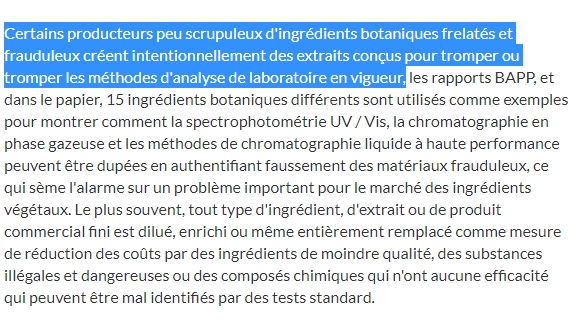Botanical ingredient adulteration - how some suppliers attempt to fool commonly used analytical techniques
S. Gafner, ISHS Acta Horticulturae 1287: XXX International Horticultural Congress IHC2018: International Symposium on Medicinal and Aromatic Plants, Culinary Herbs and Edible Fungi, IV International Jujube Symposium and VI International Symposium on Saffron Biology and Technology
As the global market for herbal medicines and dietary/food supplements has increased, so have reports of undisclosed ingredients being added to botanical raw materials, extracts, essential oils, and finished consumer products. Reports include accidental misidentification of botanical materials due to human error. More often, however, adulteration is carried out for financial gain, also referred to as economically motivated adulteration (EMA), where raw materials, extracts, and essential oils are intentionally substituted, diluted, or “spiked” with undisclosed lower-quality ingredients. This reflects a significant challenge to the global botanical medicine marketplace and, in some cases, impacts consumer safety. In 2011 the American Botanical Council (ABC), the American Herbal Pharmacopoeia (AHP), and the National Center for Natural Product Research (NCNPR) at the University of Mississippi initiated the ABC-AHP-NCNPR Botanical Adulterants Prevention Program, a large-scale program to educate members of the herbal and dietary supplement industry and various stakeholders about ingredient and product adulteration. The chemically complex nature of herbs and botanically-derived ingredients calls for unique quality control processes of herbal products. One of the universal regulatory requirements in industrialized nations around the world is the appropriate testing for identity and authenticity of botanical materials.
However, unscrupulous suppliers often take advantage of a lack of specificity in test methods used to confirm the identity of a botanical ingredient by providing materials that may comply with these identity tests even if they do not correspond to the material declared on a certificate of analysis or label. Ingredients for which adulteration has been reported include, e.g., extracts of bilberry (Vaccinium myrtillus) fruit, black cohosh (Actaea racemosa) root/rhizome, cranberry (Vaccinium macrocarpon) fruit, ginkgo (Ginkgo biloba) leaf extract, saw palmetto (Serenoa repens) fruit, and St. John's wort (Hypericum perforatum) herb, among others.














